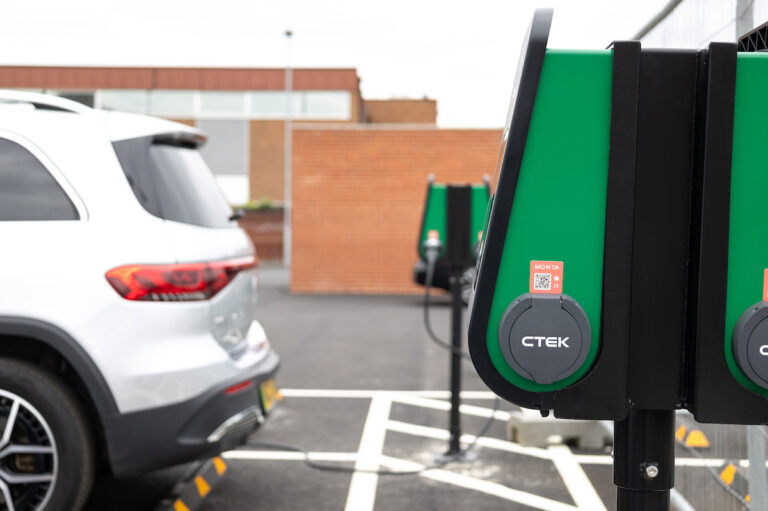Employers can attract younger recruits by installing Electric Vehicle (EV) charging at their workplaces, says the EV charging equipment company CTEK.
A YouGov survey for CTEK discovered that workplace charging is the most often used charging option for EV owners/drivers aged from 18 to 24 in the UK (40%).
They are also the second most likely age group of non-EV owning workers to be positively influenced to switch to an EV by charging options at the workplace – 61%, second only to 25-34 year olds (63%)
Cecilia Routledge, CTEK’s Global Director Energy and Facilities, said: “Workers aged 18 to 34 are a key pool of  talent which many employers are seeking to be attractive towards when they want to recruit and retain people in the early stages of their careers.
talent which many employers are seeking to be attractive towards when they want to recruit and retain people in the early stages of their careers.
“Having the ability to charge their EVs at work is going to be particularly attractive to today’s and tomorrow’s younger EV drivers who as a demographic are less likely to have access to a home charger because of where they live, such as in an apartment block or other rental property.
“Our YouGov survey found that almost twice as many 18 to 24 year olds who have already switched to an EV would prefer to charge at home (35%) than usually do so (18%), suggesting that gap in home charging availability.
“So, a business or other organisation with EV charging at the workplace is onto a winner as an employer of choice for young adult workers.”
CTEK’s annual YouGov EV survey found demand for workplace charging continues to grow across all five European countries studied. A quarter of respondents said they would prefer to charge at work. That 25% in 2023 was up from 14% in 2022 and 12% in 2021.
Cecilia said: “Workplace charging makes sense for many EV owners. Their EV gets them to work and then sits there all day doing nothing whilst its owner does the work. It’s a great time to charge, especially if you have no home charging available or your employer provides charge for free.”
The 2023 YouGov survey found insufficient public charging is fuelling growing anxiety over topping up an EV’s battery. Just over two thirds (68%) of respondents across five European countries said EV drivers have charger anxiety, up from 59% in 2022. And 74% said there is not enough charging infrastructure, up from 62% in 2022.
More than half of EV drivers (55%) now encounter broken public chargers at least one in five times when they arrive hoping to charge. And almost three fifths (58%) of EV drivers have to wait to use a public charger at least one in five times.
Cecilia said: “Workplace charging has the potential to provide a vastly different experience to that being endured by EV drivers at public locations.
“Employers can install EV charging by specifying more robust, but still affordable, fast charge points which typically supply between 7kW and 22kW, ideal for when vehicles can be parked and charging for a few hours during the working day.
“Employers can also design in load balancing into their installation, to protect their local power grid and optimise charging across multiple outlets. And employers are usually present on site, to react to any technical issues and keep chargers operational.
“And they can organise access times and durations to best serve their workers’ EV charging needs. So, no queueing. It’s the opposite of charging anxiety. It’s charging calm, charging confidence.”
CTEK is urging employers to futureproof their workplace charging provision by installing infrastructure for expansion as EV ownership rises. The YouGov survey found that across the five European countries one in three people (33%) plan to have a fully electric or plug-in hybrid EV as their next vehicle.
Cecilia said: “When designing your workplace EV charging, don’t cater for today’s demand – think about tomorrow. Think about next year and beyond. There is a lot of advice and support available and grants to install charge points now and to prepare for future expansion.”
In the UK the Government’s Workplace Charging Scheme offers grants of up to 75% of the total costs of the purchase and installation of EV charge points for staff or fleet use only, capped at a maximum of £350 per socket for up to 40 sockets across all sites per employer.
Small-to-medium-sized businesses (SMEs) can also get grants to install electric vehicle charging infrastructure in their car parks. The EV infrastructure grant covers up to 75% of the cost of installing the infrastructure needed for charge points to operate and for future charge points to be installed, as well as the cost of any chargepoints installed. There is a limit of £15,000 per grant.

